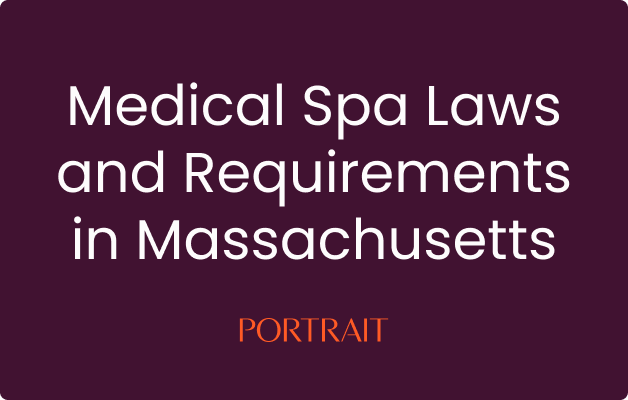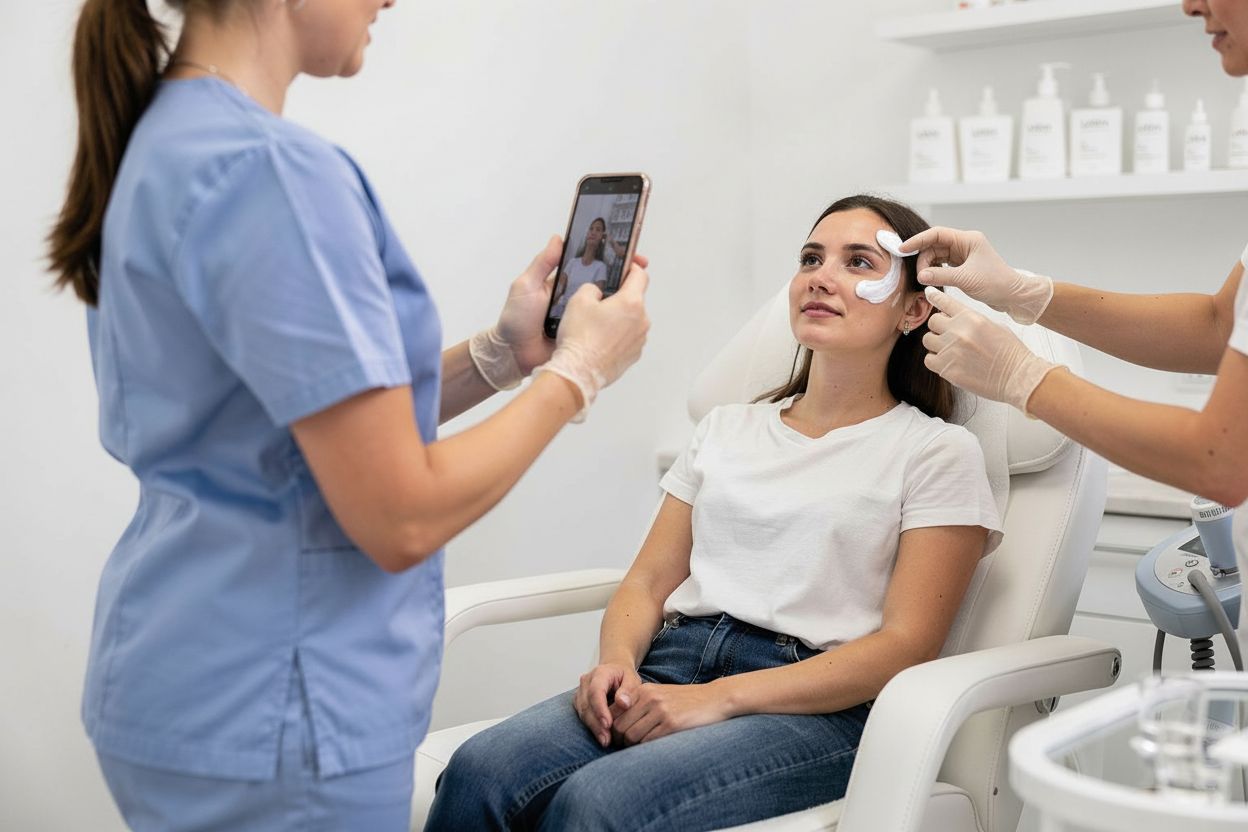Medical Spa Laws and Requirements in Massachusetts

Empowering Professionals at Every Stage
Portrait offers strategic expertise to help you make informed decisions and achieve long-term success.
Book Intro CallWhile Massachusetts law does not provide a specific statutory definition for medical spas, they are generally considered licensed healthcare facilities that offer non-surgical aesthetic treatments. This guide will outline the key regulations you need to know for compliant and successful operation in the state, helping you build your practice with confidence.
How Medical Spa Laws Work in Massachusetts
In Massachusetts, the distinction between a medical spa and a day spa is determined by the services provided, not a specific legal definition. Medical spas offer procedures considered the practice of medicine, such as neurotoxin injections and laser treatments. Day spas, by contrast, are limited to non-medical aesthetic services like superficial facials.
Because they perform medical procedures, med spas face stricter med spa regulations designed to protect patient safety. Understanding the state's rules is crucial for med spa compliance and clarifies who can open a med spa legally. These regulations ensure that all medical decisions are made by qualified, licensed professionals.
To operate, your clinic will need a license from the Massachusetts Department of Public Health (DPH), which is one of the key Medical Spa Requirements in Massachusetts. Individual practitioners must also hold licenses from their respective professional boards. These governing bodies include the Board of Registration in Medicine, the Board of Registration in Nursing, and the Board of Registration of Cosmetology and Barbering.
Medical Spa Requirements in Massachusetts
To ensure full med spa compliance, you must meet specific requirements for ownership, licensing, and practitioner qualifications. State law dictates who can own a med spa, generally limiting ownership to licensed physicians or certain nurse practitioners due to the state's corporate practice of medicine prohibition. Beyond ownership, your practice will need a license from the DPH, and all procedures must be performed by appropriately credentialed professionals.
Medical Spa Ownership & Business Structure Requirements in Massachusetts
Massachusetts enforces the corporate practice of medicine (CPOM) doctrine, which shapes the medical spa ownership laws in Massachusetts. This rule means that only licensed physicians or certain nurse practitioners with full practice authority can legally own a medical practice. Therefore, understanding these med spa regulations is the first step in establishing your business.
For non-physicians wondering who can own a med spa, the answer involves a specific business arrangement. While you cannot own the clinical practice directly, you can partner with one through a Management Services Organization (MSO). This structure allows you to manage the administrative and business operations while a licensed professional maintains control over all medical services, ensuring med spa compliance.
The clinical side of the practice must be formed as a professional entity, such as a professional corporation. Additionally, all Spas in Massachusetts offering medical services must have a designated medical director who is a licensed physician or independent NP. This director is responsible for all clinical oversight, including training and procedures.
Facility, Licensing, and Compliance Requirements in Massachusetts
Securing your medical spa license in Massachusetts begins with obtaining a clinic license from the state's Department of Public Health. Your business will also need standard registrations, such as a general business license and potentially a separate registration if you operate under a different name. These initial Medical Spa Requirements in Massachusetts establish the foundation for a compliant practice.
Adhering to strict med spa regulations in Massachusetts is critical for patient and staff safety. This includes implementing clear OSHA-compliant policies for hygiene and infection control, as well as robust HIPAA protocols to protect all patient health information. Proper staff training on these safety and privacy standards is a non-negotiable part of your operational plan.
Comprehensive insurance is another pillar of med spa compliance, including both general liability and mandatory malpractice coverage for your licensed professionals. Your marketing must also follow strict rules, avoiding misleading claims and obtaining patient consent for testimonials or photos. Meticulous recordkeeping, from consent forms to detailed treatment notes, is essential for managing risk and demonstrating professionalism.
Who Can Perform Medical Spa Procedures in Massachusetts?
In Massachusetts, procedures like neurotoxin injections, fillers, IV hydration, and most laser treatments are considered the practice of medicine. These services must be performed by licensed medical professionals to ensure proper med spa compliance. Aestheticians, by contrast, may perform non-medical services such as superficial peels and certain types of microdermabrasion.
The Medical Spa Laws in Massachusetts dictate that only licensed medical professionals can administer injectables like Botox and perform IV hydration therapy. While physicians and nurse practitioners are authorized, other licensed staff such as physician assistants or registered nurses may perform tasks based on proper delegation and supervision. These med spa regulations ensure patient safety is the top priority in all Spas in Massachusetts.
The state has specific laser regulations Massachusetts that you must follow. While most laser treatments are medical procedures, laser hair removal can be performed by a professional licensed by the Board of Cosmetology, who must practice under physician supervision for two years before seeking an independent license. Aestheticians performing this service also require 30 hours of IPL device training.
All medical services require oversight from a designated medical director, who must be a licensed physician or an independent nurse practitioner. For example, nurse practitioners must complete at least two years of supervised practice to gain full practice authority. Adhering to these supervision and delegation rules is a critical component of your Medical Spa Requirements Massachusetts.
Laser & Energy Device Regulations in Massachusetts
The Medical Spa Laws in Massachusetts classify most laser and energy device procedures as the practice of medicine, requiring their performance by licensed medical professionals. However, the state makes a specific exception for laser hair removal, which has its own distinct set of med spa regulations. This distinction is critical for maintaining med spa compliance and understanding your operational scope in Spas in Massachusetts.
Procedures using lasers other than for hair removal must be performed by a physician or qualified nurse practitioner. For laser hair removal, a professional licensed by the Board of Cosmetology can perform the service under physician supervision for two years before they can apply for an independent license. Aestheticians performing laser hair removal must also complete 30 hours of IPL device training to meet the Medical Spa Requirements Massachusetts.
Medical Spa Enforcement, Penalties & Risk Management in Massachusetts
Failing to adhere to the Medical Spa Laws in Massachusetts can expose your practice to serious legal and financial risks. State boards and the Department of Public Health actively enforce these med spa regulations to protect public safety, and violations can result in enforcement actions ranging from cease-and-desist orders and fines to professional board discipline. Understanding the potential penalties is essential for maintaining med spa compliance and building a sustainable business among Spas in Massachusetts.
Many violations stem from a few common missteps. Here are the primary areas where practices run into trouble:
- Improper Delegation and Supervision: Assigning medical procedures to unqualified staff or failing to provide the required oversight by a medical director
- Unlicensed Practice of Medicine: This often arises from incorrect ownership structures that violate the corporate practice of medicine doctrine, directly impacting who can own a med spa legally.
- Misleading Advertising: Making unsubstantiated claims about treatment outcomes or using patient images without explicit consent
- Inadequate Documentation: Poor record-keeping for patient consent, treatment plans, and medical histories
Proactive risk management is your best defense. To ensure you meet the Medical Spa Requirements Massachusetts and are prepared for any audits, we recommend these best practices:
- Conduct regular internal audits of your procedures and documentation
- Implement a continuous training program for all staff on safety, privacy, and the latest med spa regulations
- Maintain meticulous records for every patient interaction, from initial consultation to post-treatment follow-up
- Consult with legal and compliance experts who specialize in healthcare to review your business structure and operational protocols
By embedding these practices into your operations, you can confidently navigate the state's rules and focus on growing your clinic.
Stay Compliant with Portrait Care in Massachusetts
Staying compliant in Massachusetts means mastering a few key areas: structuring your business according to the corporate practice of medicine doctrine, securing the proper DPH and professional board licenses, and implementing rigorous protocols for supervision and risk management.
Please note this guide is for informational purposes and is not a substitute for legal advice. We recommend consulting with a qualified healthcare attorney to address your specific circumstances.
At Portrait Care, we provide the technology and operational support to help you manage compliance with confidence. Our all-in-one platform gives you the tools and resources you need to run a safe and efficient business while you focus on patient care. Learn more about opening a compliant med spa and discover how our platform can support your growth. Book your demo today to see how top medical wellness clinics use Portrait to run smarter and grow faster.
One Platform.
Everything You Need.
Everything You Need.
Portrait combines the technology, support, and savings to run and scale your modern medical wellness business.
Book Intro Call
Stay Connected with Portrait Care
Subscribe to our email list and receive the latest insights, updates, and exclusive content delivered straight to your inbox.




![Who Can Own a Medical Spa? [State by State Guide]](https://cdn.prod.website-files.com/67981e0672f9e49c5b9cb890/69869b11472946b6ec9fe1f0_1770427418079.jpeg)
